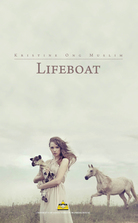 Kristine Ong Muslim. Lifeboat. University of Santo Thomas Publishing House, 2015. 109 pgs. $18.00
Kristine Ong Muslim. Lifeboat. University of Santo Thomas Publishing House, 2015. 109 pgs. $18.00
Reviewed by Lynn Domina
The poems in Lifeboat feel haunted. Although the syntax and vocabulary are exceptionally straightforward, the imagery and tone leave the reader unsettled. Things are not as they seem—the poems describe horses “that thump the oceans flat,” spiders as “the stuff made of time,” companions disguised by fog. Deceptively accessible, the language of the poems hovers above a suggestive depth of meaning. Word by word, readers understand the sentences, but poetic language is nothing if not figurative, and the metaphors here disconcert. The poems are memorable, therefore, not only through their striking imagery but also through the emotional resonance.
Here, for example, is “First Day of September”:
The house crouches,
an angular juggernaut
of gray, brown, and green
against an infinity of white.
Inside, even Mahler cannot
drown the hush. This time
of the year, we are all wolves
drunk with stealth, misled by
the stillness of the dirt road
that leads to the ranch,
and we understand that
the horses are the whole world,
remember the half-light striking
the water in the trough where
the cows drink—their thirst
a ripple on the water’s surface.
At first glance, the title seems simply descriptive, a phrase to anchor the poem that will follow. (Muslim’s titles are most often direct and minimalist—“Horses,” “The Pilot,” “Spiders”—though occasionally they are more unusual—“The One Called Sunday,” “The Discovery of Laughter,” “He Ate Himself to Death.”) By the time we finish the poem, however, and return to the title, we realize its significance, for “This time / of year,” when summer is fading into autumn (at least in the northern hemisphere) and the year is veering toward its conclusion, caution does increase, in contrast to carefree spring.
Initially, the house in the poem seems abandoned and its setting, “an infinity of white,” desolate. If Mahler plays inside, though, even if only in the speaker’s imagination, the house is inhabited by at least one consciousness. Muslim’s word choice, “hush,” is evocative, suggesting a soft restful quiet rather than, for example, a fearful silence. Yet fear is exactly what emerges in the next sentence as “we are all wolves / drunk with stealth.” Such a line suggests that stealth is much more than the caution that distinguishes predator from prey, for we are “drunk” with it. We are overcome, our judgment dissipated. Overwhelming our self-control, our stealth exerts control over us. Then the sentence, at its midpoint, makes an odd turn: “we understand that / the horses are the whole world.” Maybe the horses are prey, for to an intent predator, prey can form “the whole world” of attention. I think there’s more going on in this poem though. I think this line captures the speaker’s epiphany, that each moment comprises the entire universe, that every creature is here now, and that here now is the center of all life.
If such a statement seems too mystical, let me support it with some discussion of craft. The speaker’s insight, “the horses are the whole world,” occurs on line twelve of sixteen, at exactly the three-quarter point. Effective lyrics often adopt the strategy of a sonnet, with a turn occurring somewhere between the two-thirds and three-quarter mark. In this line, a subordinate clause—for it actually begins with “that” on the previous line—is treated as an independent clause so that the line sounds like a sentence. That is, through Muslim’s use of the line, “the horses are the whole world” reads as if it stands alone. The verb “are” conveys presence without action or movement, so nothing is changing in the line; the moment extends into eternity. As the sentence continues, the speaker moves from the present into memory, conveyed through image, such that the horses remain in the continuous present:
…the half-light striking
the water in the trough where
the cows drink—their thirst
a ripple on the water’s surface.
The speaker’s vision of the horses evokes through association her memory of a trough and the image of “half-light striking” the water. The speaker has been attentive to detail, noticing how elements of nature interact. Her habit of attention has prepared her for the epiphany she describes in the poem. Although the individual sections—the house, the stealthy wolves, the horses, the cows drinking water—could seem disparate, they all eventually serve the poem’s purpose and contribute to its meaning.
Many of Muslim’s poems open out like this, into mystery. The final poem in the collection, “Hunger Strike,” explores presence and absence, layering human physicality with emotional weight. It begins with a statement that is strange in what it finds strange:
Strange how we do not alter ourselves
to fit the dimensions of this room
in order to fill it completely.
It’s impossible, isn’t it, to alter ourselves that much, or to fill a room completely—unless, of course, the poem isn’t talking about simple bodies. The poem explores the location of childhood, its tone midway between sinister and nostalgic. It concludes with a description of the past infusing the present:
Upstairs, we hold hands with the
versions of ourselves, the dead girls
who will live and live and live.
Read in isolation, the last line of this poem and the book would indicate that the collection is extraordinarily optimistic. But the last line cannot be read in isolation; “the dead girls” echo through it. Muslim exploits language this way throughout Lifeboat. Her sentence structure most often illustrates English at its most basic: subject, verb, object. Her word choice is most often monosyllabic. Yet her patterns of imagery and thematic concerns are deeply complex. One closes the book the first time, and the second time, strangely puzzled, as if comprehension waits just out of sight, not to be grasped at but to be patiently awaited.
